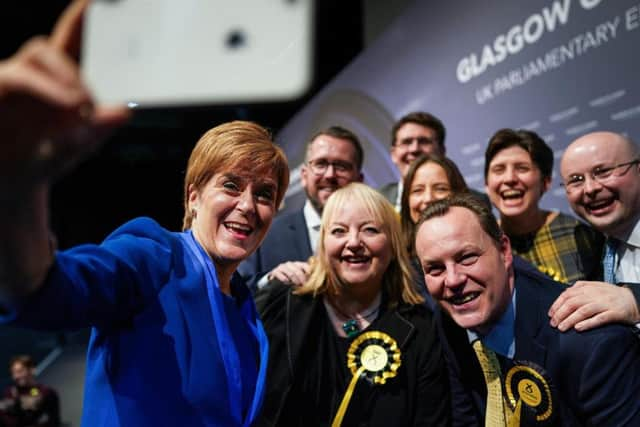Nicola Sturgeon calls for Labour support to secure Scottish independence referendum
Speaking ahead of a planned statement to the Scottish Parliament today, the First Minister said Scots had “rejected a Tory government, said no to Brexit and endorsed the proposition that they should be given a say on their own future”.
In a direct pitch to Labour members in Scotland who are now considering backing an IndyRef2, Ms Sturgeon compared the result of last Thursday’s poll to the 1992 general election which saw the Conservatives returned with a surprise majority - despite a second successive landslide for Neil Kinnock’s party north of the Border.
Advertisement
Hide AdAdvertisement
Hide AdThe First Minister is expected to issue a formal demand before the end of the year to the UK Government for a Section 30 order, which would give Holyrood the legal power to organise an IndyRef2.


Senior Conservatives have repeatedly said they will flatly reject any such request, with Boris Johnson last weekend calling the SNP leader to make “clear how he remained opposed to a second independence referendum”.
The SNP has been emboldened in its demands for a second plebiscite on the constitution after it increased its share of the vote to 45 per cent - winning a greater proportion of the votes there than the Tories did across the UK - and claiming 47 out of 59 seats in Scotland in the process.
The First Minister said: “This election result is a watershed moment for Scotland.
“People were faced with a clear and distinct choice, and they made their verdict clear – they have rejected a Tory government, said no to Brexit and endorsed the proposition that they should be given a say on their own future.
“That position is increasingly winning support from across the political spectrum, including from senior and prominent members of the Scottish Labour party, who may not yet back independence but who recognise the fundamental democratic principle which is now at stake.
“In 1992 when we were also facing the prospect of a fourth Tory government with no mandate in Scotland there was a coming together of parties, communities and civic Scotland.
“That resulted in the establishment of this Parliament, which has achieved much.
Advertisement
Hide AdAdvertisement
Hide Ad“But this new wave of Brexiteer Tories with a mission to reshape Scotland and the UK in their right-wing image presents a new danger – one that very few would have predicted at the dawn of devolution.
“So I hope in the coming days and weeks we will see a similar coming together around the idea of Scotland’s right to choose.”
The SNP leader added: “The SNP’s mandate for an independence referendum is stronger than any mandate Boris Johnson claims for his Brexit deal. He asserts a mandate to take the whole of the UK, including Scotland, out of the EU, on a lower share of seats and votes then the SNP won in Scotland.
“We are facing a Conservative government which Scotland did not vote for and which presents a real danger to our country.
“The Scottish Parliament has a duty to protect the values that people in Scotland voted for. I believe we can only fully do that with independence, and that is why later this week, I will take the next steps to secure Scotland’s right to choose.”
Ms Sturgeon’s reference to the 1992 result is calculated to reach older Labour supporters who will recall an election that Neil Kinnock’s party was widely expected to win - only to see John Major’s Conservatives returned with a majority.
Labour won 49 of 72 possible seats, with many of its MPs actively supporting an on-going campaign for the creation of a Scottish parliament.
It was far removed from the catastrophic defeat Jeremy Corbyn’s party endured at last week’s election, where it was reduced to a single MP in Scotland.
Advertisement
Hide AdAdvertisement
Hide AdWriting in The Scotsman today, Scottish Labour leader Richard Leonard said the result had “sent a strong message to Labour and it would be a grave mistake not to listen”.
He continued: “It is my view that instead of expecting the people of Scotland to come home to Labour, Scottish Labour must instead come home to them.
“On the doorstep, it was clear that many voters liked and supported our manifesto, which is in line with what opinion polling has consistently suggested, but frankly doubted whether we could be trusted to implement it.”
He added: “It is clear that 20 years on from devolution the British state is too centralised and there are real imbalances of power in the economy too. In our manifesto, we promised to set up a Constitutional Convention to decentralise power.
“Learning the lessons from the Scottish Constitutional Convention, we now should establish a Constitution Convention in opposition. This could develop a blueprint which will be ready to legislate for and implement in Government. And we should be prepared to work on this with other parties and organisations if and where this is possible.”
Pamela Nash, chief executive of Scotland in Union, said: “Scotland already has the right to choose and we chose to remain in the UK.
“The majority of people of Scotland also chose pro-UK parties at last week’s General Election.
“And barely a quarter of Scots would choose to hold a divisive second independence referendum next year, according to polls.
“Scotland deserves better than a government obsessed with creating division between families and friends.”